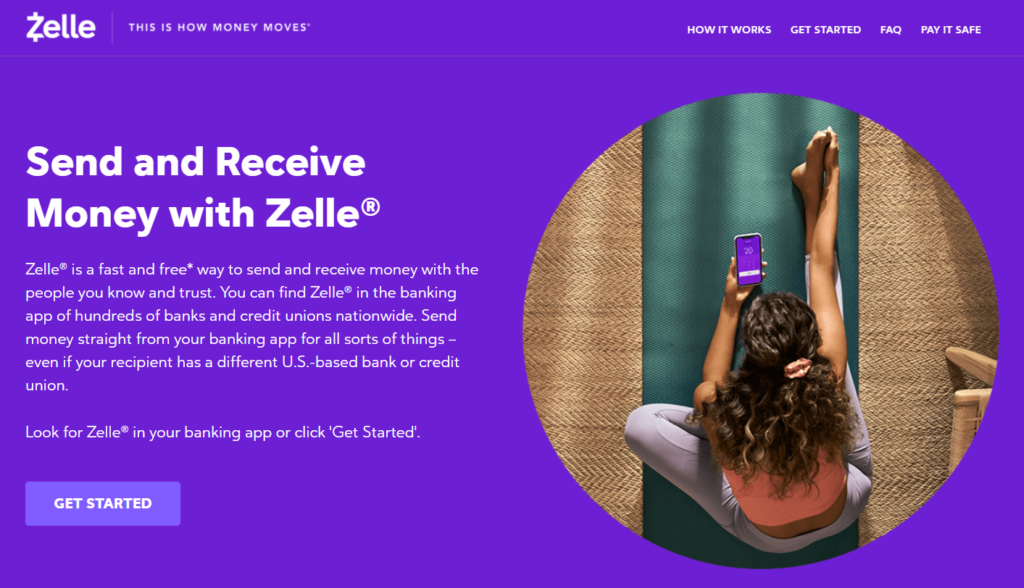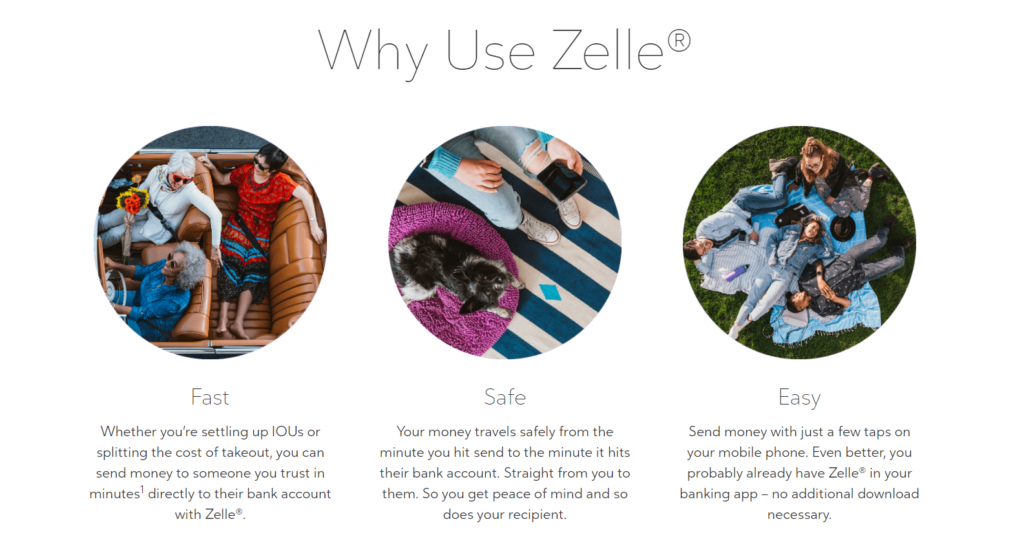Key Takeaways
Zelle is an online money transfer service introduced in 2017. It is backed by America’s largest banks. It is often touted as the Banks’ answer to online money transfer platforms like PayPal, Venmo, Square, and e-wallets like Google Pay, Amazon Pay, etc.
Zelle offers free money transfers and receiving money services within the US. Customers registered with Zelle and having a bank account with one of the partner banks can transfer amounts for free. The fund transfer is hassle-free and takes a few minutes to complete the offer. The big plus here is that costs nothing.
Zelle was launched in 2017 and is owned by Early Warning Services. In a short time, it has progressed as one of the top electronic money transfer solutions. It processed over 1 billion transactions in 2020 with more than $307 billion network volume for these transactions.
Company Profile
Zelle is owned by Early Warning Services, LLC, a fintech that offers financial solutions to the corporate world.
Let us briefly view the company profile of Zelle and its parent company Early Warning Services, LLC.
| Company Name | Zelle Parent Company – Early Warning Services, LLC. |
| Website | zellepay.com |
| Founded in | 2017 |
| Founder | Early Warning Service, LLC. |
| Key People | Albert Ko – CEO, Lou Anne Alexandar – Chief Product Officer, Rose Corvo – Chief Marketing Officer |
| Headquarters | Scottsdale, Arizona, US. |
| Business Model | P2P payment platform, digital money transfer. |
| Products | Digital Money transfer services. Pay and Receive Money. |
| Competitive Advantage | Fintech, Free Services, Backed by the Top American Banks. |
| Revenue | Undisclosed |
| Competitors | Venmo, Square, Payoneer, PayPal, Braintree, etc. |
Introduction – a Brief History of Zelle
Early Warning Services, LLC is the parent company of Zelle. It is backed by the top US banks and credit unions. Some of the big banks like Wells Fargo, Bank of America, Chase, Citi, and JPMorgan, etc.
Before launching Zelle in 2017, Early Warning Services, LLC had an online payment platform “ClearXchange”. The company discontinued it and introduced the new Zelle mobile payment solution with improved services. Thus, it’s important to note that Zelle had an established customer base when it was launched. It was a significant competitive advantage that Zelle Enjoyed over its competitors like Venmo, Cash App, Payoneer, and Braintree, etc.
Zelle has partnered with more than 1,600 banks and credit unions throughout the US. It serves the US customer base only. Customers need a bank account or debit card issued by any of their partner financial institutions to register an account with Zelle. However, customers can directly use Zelle mobile app without a bank account in any of its partner banks as well.

What is Zelle? What Does it offer?
Zelle is an online money transfer platform. It mainly offers money transfer services for a Peer-to-Peer experience. It has also started offering money transfer and payment solutions to small businesses.
Customers need a card issued by either VISA or Mastercard to use the Zelle mobile application. Zelle App is compatible with all major banks and credit unions. Even if you do not have an account with any of its listed partner banks or credit unions, you can still use Zelle. You’ll need to register with an email and a mobile number (within the US).
An important feature of Zelle is its free money transfer services to its customers. It does not charge any fee for money transfers or receiving transactions. Corporate account holders using Zelle for B2C purposes may have to incur a fee on money transfers. Although Zelle does not charge a direct fee to small businesses at the moment, most of its partner banks charge a fee. This fee can range anything from 0.25% and above. The fee charged by these partner banks on average can be assumed around 1.00 %.
Zelle For Individuals
Zelle makes it super easy to transfer money to and receive from individuals. All you need to do is to use the banking mobile app for your bank or credit union. It has partnered with over 1,100 banks and credit unions in the US.
Chances are that you’ll find Zelle services already within the mobile bank app that you are using. Individuals just need to provide the recipient’s email or mobile number to initiate the transaction. The receiver will directly receive money in the bank account within a few minutes.
Customers with a bank or credit union not listed on the Zelle network can also use the service. However, the service is currently available within the US only. All money transfer services to individuals are free.
Money Transfer Limits
Money transfer limits with Zelle can be different from its banking partners. For customers using Zelle directly without a partner bank, the transaction limit is $500 weekly.
Here are a few examples of its money transfer limits from its partner banks.
| Bank | Daily Limit | Monthly Limit |
| Bank Of America | $ 5,000 | $ 20,000 |
| Chase – Personal | $ 2,000 | $ 16,000 |
| Citi Banks – Personal | $ 2,000 | $ 10,000 |
| Wells Fargo | $ 2,500 | $ 20,000 |
Zelle for Small Businesses
Zelle has also started services for small businesses. Business customers can make payments and receive money from their peers instantly.
Zelle service for small business can be used as:
- Business to business transactions
- Business to consumer transactions
- Consumer to business transactions
Zelle – Business Model
From a business perspective, Zelle uses a freemium business model. It does not charge any fees to its individual and business clients. It does not mean Zelle doesn’t make any money.
Zelle uses a business affiliate and network partnership model. It has partnered with more than 1,100 leading banks and credit unions in the US. Moreover, small businesses are using the services to send and receive money. All clients need a bank card issued by VISA or Mastercard.
Zelle’s banking and card partners charge customers for transactions made through Zelle. It means Zelle offers benefits to its partners. Thus, Zelle charges customers indirectly by receiving commission from its partners. (Although no public information is available on the commission structure of Zelle)
A key feature of Zelle’s business model is its seamless integration with banking apps. Customers do not need to create a new account with Zelle if their banking partner is on the list already. With over 1,100 banking partners, chances are that most customers are covered without a need to create a new account with Zelle.
How Does Zelle Make Money?
Zelle uses a freemium business model meaning it does not charge its customers. So, how does it make money then?
Zelle partners with banks and credit unions to offer online money transfer services. It was launched by Early Warning Services, LLC. It is backed by around 30 top US banks to provide digital payment services. Thus, Zelle is a source of a competitive advantage and revenue for all of these banks. So, it does not necessarily need to make profits directly from its customers.
Zelle also requires its customers to use a card issued by VISA or Mastercard. So, it serves them as well. All of its banking and card partners save money, charge fee, and gain competitive edge over competitors. In return, Zelle gets a share out of their profits.
Zelle – Unique Selling Proposition
Zelle’s most unique selling proposition has been its launch. It is backed by top US banks with a readily available customer base. Since its inception in 2017, it has now grown to annual transactions of over 1.2 billion.
With more than 1,100 banking partners, it can access millions of individuals and around 31 million registered businesses in the US.
Another key advantage for Zelle is its unique position to offer direct money transfer services without the need to create a separate account. The seamless experience is another unique selling proposition for Zelle. It also enjoys brand recognition with the backing of large US banks and Credit Unions.
SWOT Analyses of Zelle
Zelle has challenged digital payment services like PayPal, Venmo, Payoneer, Cash App, and e-wallets like Google Pay, Amazon Pay, and Facebook Pay, etc. In a very short time. For sure, it has its strengths and opportunities. Inevitably, it has some shortcomings and threats as well.

Let us explore the SWOT for Zelle briefly.
Strengths
Zelle has made it easier to send and receive money. Its success is built on its core features.
- Zelle enjoys brand recognition even before its inception in 2017.
- It is backed by top US banks, which means the firm is financially stronger, as much as you can think of.
- It has a readily available customer base of over 75 million customers with its banking and credit union partners.
- It does not require customers to create a new account if they already have one of its partner banks’ mobile applications. This seamless and frictionless experience is a core competitive advantage.
- It offers all money transfer services free of cost.
- The money transfer process is quick and takes a few minutes.
- It offers money transfer services to individuals as well as small business customers.
Weaknesses
Zelle has a strong business reputation and comes with a large customer base. Yet it has some weaknesses.
- Financial security experts often criticize it for its transaction security features.
- There is no possible way to reverse a wrong money transfer, even if both customers have the same banking channel.
- It offers services to US customers only.
- It currently offers limited services to the corporate world with services to small businesses only.
- Money transfer services are not always free, customers may pay indirect charges from their banks.
Opportunities
With an already established large customer base, there is little to see as an opportunity for Zelle. However, every business can expand and grow at any time.
- Zelle can expand services beyond the geographical boundaries of the US.
- It can expand services for online shopping customers similar to e-wallets.
- It can vastly improve the security concerns as there is no transaction reversal mechanism for wrong money transfers.
- It can expand services to corporate customers beyond money transfers and small business transactions.
Threats
Here are some prominent business threats to Zelle:
- It faces stern competition from its established rivals like PayPal, Venmo, Payoneer, Cash App, Braintree, and so on.
- It is yet to enter the e-wallet market that is already captured by giants like Amazon Pay, Google Pay, and Facebook Pay.
- Its security concerns can be damaging for brand reputation.
- Zelle accounts are linked with email and mobile numbers without further verification that can easily be hacked by fraudsters.